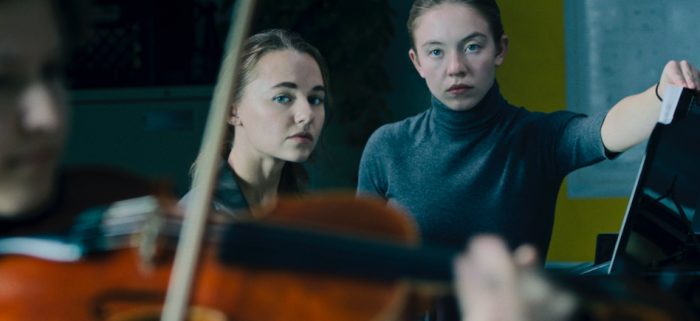'Welcome To The Blumhouse' Review: 'Evil Eye' And 'Nocturne' Focus On Great Expectations, With Not So Great Results
While the Welcome to the Blumhouse experiment continues to leave something to be desired, the way these titles are being released is rather clever. The films in the Amazon/Blumhouse partnership aren't connected, but they're being paired-off in ways that make sense, at least thematically. The first two releases – The Lie and Black Box – featured stories dealing with perception. Now, the latest two releases – Evil Eye and Nocturne – focus on expectation, be it the expectation of pleasing a parent by settling down with the right partner, or becoming the artistic giant you've always wanted to be. And yet, once again, the end results are lacking.
Evil Eye, written by Madhuri Shekar and directed by Elan Dassani and Rajeev Dassani, feels as if it was crafted to appeal to overprotective mothers everywhere. The film could easily be retitled Listen to Your Mother, Or Else!, as it spins a tale of mother and daughter connected by danger. Usha Khatri (Sarita Choudhury) lives in Delhi, India, while her daughter Pallavi (Sunita Mani) is going about her life in New Orleans. And while they're thousands of miles apart, Usha can't help but butt into her daughter's life. Pallavi remains single while her cousins her age keep getting married, much to Usha's disappointment. Mom continually checks astrology star charts while also setting her daughter up on blind dates.
It frustrates Pallavi, but she also wants to make her mother happy, which is why she agrees to yet another blind date. She shows up at a coffee shop and spots the incredibly handsome and incredibly charming Sandeep (Omar Maskati), whom she first assumes is the man Usha has set her up with. He's not, but that's okay – he seems quite taken with Pallavi, and soon the two are dating and getting very serious about their relationship.
You'd think that after all these years of prodding Usha would be happy her daughter has finally ended up in a relationship. But she's not. She's suspicious of Sandeep, especially when the usually independent Pallavi announces she's quit her job and put her entire life, financially and otherwise, in Sandeep's hands. A dark secret from Usha's past keeps prodding at her brain, increasing her concern.
Mani, who was so memorable on GLOW, is strong here, even though the script does her no favors. The problem with Evil Eye – well, one of the problems – is that it can't decide whose story this is. It's constantly cutting back and forth between mother and daughter, and while the narrative initially sets up Pallavi as our lead it eventually abandons her to focus more on Usha. Choudhury is fine in the role, but she's saddled with groan-worthy dialogue about astrology.
The direction is bland to the extreme – there are Lifetime Original Movies with more artistry. The only cinematic moment that truly sings is a phone call between mother and daughter that turns into a split-screen – a split-screen set up to make it look like Usha and Pallavi are face to face, even though they're some 8000 miles apart.
Of course, mom's concerns are justified – this isn't a spoiler, it's literally spelled out on the film's official poster – and Sandeep is bad news. But the way Evil Eye gets around to revealing this is so lazy and uninspired that it borders on comical. Evil Eye deserves acknowledgment for taking a supernatural approach that involves cultures beyond Western trappings (there are countless horror movies that use American-centric Catholicism as their guide, for instance), but that's about the only positive thing I can say here.
/Film Rating: 4 out of 10
Twin sisters Juliet (Sydney Sweeney) and Vivian (Madison Iseman) have spent their entire life in competition. They're both piano players attending a fancy arts academy, but everyone – Juliet included – knows that Vivian is the superior of the two twins. But that's about to change because Juliet just happens to find the notebook of a star music student who recently died by suicide.
After pouring over the pages of the book, which are filled with both music and spooky drawings, Juliet's playing drastically improves, to the point where she's even better than Vivian. But her personality starts to change, too, and she begins alienating those who were once close to her, turning Vivian into an enemy in the process.
Sweeney downplays all of this, barely raising her voice above a whisper, and it's an approach that works – for the most part. But we're never really given any insight into Juliet as a person. We barely know her before she starts to change, and while people keep pointing out what a different person she's become it's hard for the viewer to agree, or even understand.
And Quirke's filmmaking style only carries things so far. After a while, Nocturne stumbles under some dumb reveals. When Juliet first finds the book it's immediately apparent that some of the writing is written backward – you'd have to be blind to miss it. And yet it takes Juliet about thirty-five minutes of screentime to finally realize that and hold the pages up to a mirror. It also starts to become painfully clear that from a screenwriting perspective, Quirke has no idea how to end a scene. The solution? Make Juliet pass out. There are approximately ten billion scenes here where Juliet has a vision of something spooky and then faints, complete with the screen fading to black.
By the time Nocturne drew to its admittedly effective conclusion I was left with the same impression that's plagued every other Welcome to the Blumhouse entry so far: this would've been better as an hour-long episode of a horror anthology TV series. Sometimes, less is more.
/Film Rating: 5.5 out of 10

